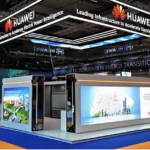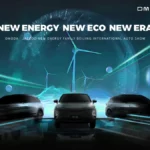
Cellular Technology – Driving the Electric Vehicle Revolution in Saudi Arabia

By Fadhel Issa, Head of Networks for Customer Unit at Ericsson Middle East and Africa

It is often met with disbelief when people learn that electric vehicles (EVs) have existed for nearly two centuries. In fact, their history dates to the 19th century, when several breakthroughs in battery and electric motors made it possible to develop basic small-scale electric cars. Unfortunately, their popularity was short-lived as gasoline-powered vehicles soon became far less complex, widely available, and more affordable.
Today, electric vehicles have made a hard comeback. Much of this could be attributed to greater social awareness spreading around the effects of fossil fuels, and a wide range of government initiatives being implemented globally to limit carbon emissions. While fossil fuels have been the lifeblood of our modern economy, the environmental push toward reducing greenhouse emissions has made it important that we explore innovative solutions that reduce carbon footprint and address the climate crisis.
Electric vehicles are championing this cause in the automotive industry, holding massive social and economic promises. We are on the verge of a truly climate-conscious age and electric vehicles are set to be critical drivers in our journey towards a sustainable future.
Massive potential for the Arab Nation
For countries in the Middle East that have traditionally relied on fossil fuels to power their development, increasing electric mobility is a gateway to accelerate their agendas to transition from an oil-based economy to a knowledge-based one. In the last few years, we’ve seen Saudi Arabia give immense focus to sustainably diversifying its economy and develop various clean energy frameworks under Vision 2030. Electric vehicles have become a vital element in the Kingdom’s strategy with the government this year announcing plans to buy 100,000 electric vehicles and set up three electric car plants in the region.
The adoption of electric vehicles will bring a range of benefits to the Kingdom, a significant one being reduced fuel costs that would turn into available disposable income to spend in the local economy. Possessing vastly greater efficiency than gasoline-powered internal combustion engines, they will also offer significant monetary returns in fuel savings to residents across the nation. No doubt oil is becoming a limited resource and EVs promise to significantly help Saudi Arabia conserve its energy resource.
Connected and autonomous mobility – The new promise of EVs
Over the last few years, the rise of EVs has propelled advancements in connected and autonomous mobility. In fact, connected mobility and automated capabilities, powered by emerging digital technologies, have gotten so integrated into the fabric of the industry that they are redefining the concept of electric vehicles entirely.
Autonomous and connected electric vehicles are set to usher in a new era of travel that is efficient, affordable, clean, and green. Capabilities such as collision warning and autonomous emergency braking will reduce accidents and deaths and help nations in creating a far safer transportation sector. Smart sensors equipped with electric vehicles that gather data and analyze road environments will ensure lesser traffic congestion and reduced travel time, all in all greatly helping lower emissions.
Cellular technology – Empowering connected electric mobility
According to one statistic (Statista), the connected car market is forecast to reach $166 billion by 2025. Being powered by digital technologies that rely on cellular connectivity such as Artificial Intelligence (AI) and Internet of Things (IoT), strong network infrastructure will become essential in propelling the industry. A great network will also expand the scope of autonomous mobility, enabling direct, fast, and advanced broadband data communication between vehicles.
Today, 5G connectivity is becoming a key enabler and growth driver for connected mobility. This is because 5G has extremely low latency and high capacity that enables various automated capabilities and fosters innovation in the connected mobility space. Being far more reliable than previous generation networks, 5G ensures the quickest delivery of time-critical information. It is also enabling remote control of vehicles and fleets with short response times and guaranteed network resources.
A bright future
Vehicles are getting connected, electrified, and more automated than ever. We are currently actively working on solutions spanning IoT and cloud to ensure the connected and automotive mobility industry blooms in the coming years. We know networks are complex and have been focused on building a standard that makes networks for the connected vehicles of the future easy and manageable. Innovating solutions to connect billions of cars, across borders, we’re preparing for the next revolutionary phase of mobility.
Working alongside our regional partners we look forward to helping Saudi grow its connected and electric mobility industry. As Saudi Arabia aims to make 30 per cent of its cars electric-powered by 2030, we are determined to help Communication Service Providers (CSPs) in the region capture the value of these opportunities by monetizing the provision of 5G connectivity and support them in bundling connectivity with value-added services such as systems integration and data analytics.
















































